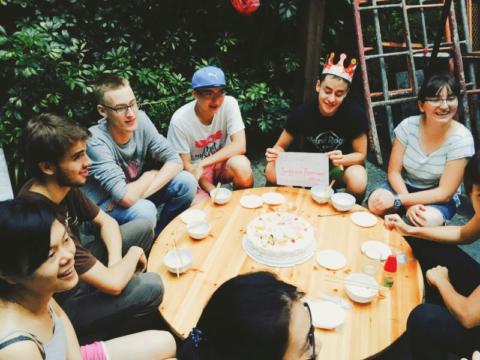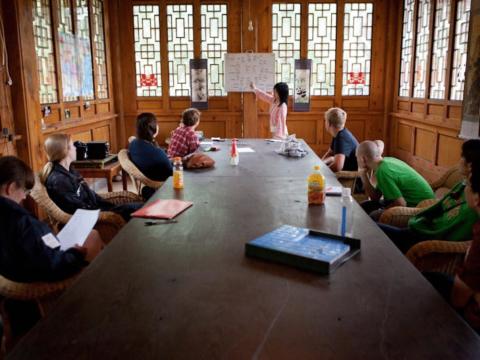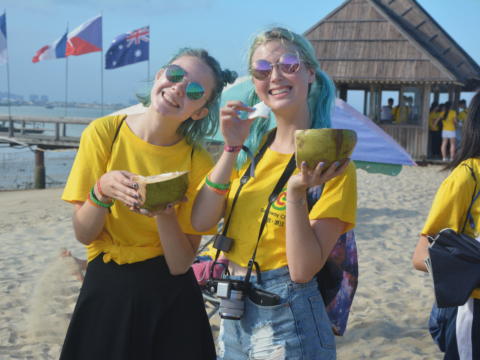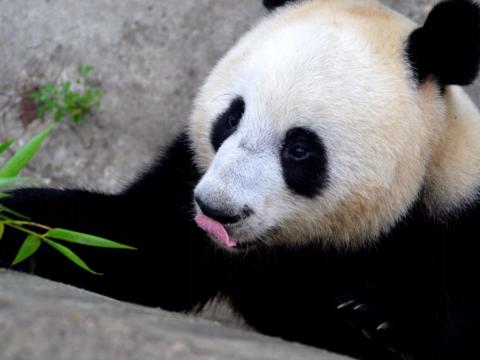Only 0€ per week!
Au Pair China
Au Pair China - China
Our Au Pair China program offers the perfect opportunity to learn Chinese and experience China as an Au Pair child carer.
Do something constructive while experiencing a complete cultural immersion, making new friends from halfway across the world! You’ll enjoy free language lessons, absorb cultural experiences like Beijing opera and Tai Chi, and experience a whole host of other activities and excursions through this program.
Program Description
Introduction
Our Au Pair China program offers the perfect opportunity to learn Chinese and experience China in the heart of Beijing, Shanghai or the other metropolis cities of the country.
The homestay structure offered through this program gives young people from around the world a unique, close-up look at Chinese life and culture. You will pair with a host family who will take care of you as you contribute to their family in a variety of ways. It is common to form lifelong friendships with your host parents and siblings.
Under our care, you will also have access to Mandarin language lessons, absorb cultural experiences like Beijing opera and Tai Chi, and a whole host of other activities and excursions we can arrange for you.
This program suits people who are positive, passionate and love working with children. You will also need to be open to other cultures and eager to learn about Chinese culture and language.
Your Assignment
Your role will be to help your host family; especially their child or children, with their English through a lot of conversation and assisting with the children’s homework. You’re also expected to attend to basic childcare and light housework. You will be expected to spend time with your host family and to serve as a positive role model and mentor for the host family’s children.
Main Benefits Included
- Room, wifi and meals provided by the host family
- Orientation training, including a welcome meal, welcome package, networking events with fellow participants and local staff, language and culture classes, a half-day tour of Beijing or Guangzhou, and more!
- 1000 RMB/month stipend for personal expenses
- 500 RMB flight allowance will be awarded for each full month of the program completed
- Program completion bonuses after successful milestones:
- 3 months = 1,000 RMB
- 6 months = 2,500 RMB
- 12 months = 4,000 RMB
- Personal accident insurance during the duration of your program
- A detailed pre-arrival package
- Free SIM card
- Free Beijing, Shanghai local transportation card
- Access to Chinese language lessons with professional teachers
- A monthly cultural immersion activity organized by the agency
Hours
Each participant should commit to 30-35 hours/week, an average of 5-6 hours/day –this includes the time you will spend teaching English to your host family (particularly the family’s children).
But you will earn days off as you work!
You will receive:
- 1.5 consecutive days off weekly (this may not coincide with the weekend!)
- 1 weekend (both Saturday and Sunday) off every month,
- and 3 additional days of vacation for every 3 months of the program completed.
Application Process
Here’s how the process looks like, step by step:
- Handing in of your application and supporting documents
- Skype interview arranged with staff
- Family matching process begins
- Skype Interview with host family arranged
- Visa applied for and flight ticket arranged
- Prepare to come China…
- Join your new family, and start your life in China!
Frequently Asked Questions
When and how long does this program run?
Our standard program offerings are 3, 6, and 12 months. Other program lengths are sometimes possible as well, but are handled on a case-by-case basis. Should you be interested in a program of non-standard length, please contact us to discuss arrangements.
How old are the children who I will look after?
It varies. In general, the host families will have children with ages ranging from 2 to 8 years old, though they may have 8-15 year-old children as well. It is also worth noting that some host families have two or more children.
Will I be required to be able to speak Chinese at the start of my program?
We ensure that at least one member of each host family can speak at least a basic level of English. But to help you fit in and interact with the locals, we offer Chinese classes!
How can I learn Chinese?
We provide Chinese classes 6 hours each week, except during the following times:
- The last week of each month. Instead, one weekend day of the last week of each month is reserved for a cultural activity (a visit to a museum, a trip to a historical site, etc.).
- On Chinese national holidays.
There is no additional charge for these Chinese classes. Classes will be arranged around your work schedule with your host family.
How long will it take for me to be matched with my host family?
The process usually requires about 1-2 months, but sometimes can take as little as 2 weeks.
Do I need to bring money with me to help me settle in?
In order to cover personal expenses not covered by the program before receiving the pocket money for the first month, we recommend that you bring between 600RMB and 1,200 RMB (about $100-$200 USD) with you to start the program.
Am I allowed to have a second job to earn extra money during the program?
No. This would violate the terms and conditions of your visa, which is for cultural exchange purposes only.
Will I need to drive while in China?
Your host family will most likely not require you to drive. Additionally, China does not recognize drivers’ licenses from other countries, including international drivers’ licenses, and the process for non-Chinese nationals to apply for a Chinese driver’s license is very cumbersome. However, if both you and your host family agree, you can apply for a Chinese driver’s license. You should consult our staff before applying for the license.
What happens if my host family and I don’t get along?
In our experience, problems which arise between program participants and their host families are usually due to cultural differences or communication issues. If you and your host family are having trouble getting along, our team will help you and your host family to discuss the issues and resolve them effectively. If no resolution can be reached, we will match you with a new family as quickly as possible. Switching to a new family typically requires 2-4 weeks.
What sort of help and assistance can I expect to receive during the program?
From the moment we meet you at the airport when you arrive in China to the last day of your program, our team will always be there to talk to you, know how you’re doing, and help you with any problems you run into along the way, program-related or not. We will strive to make sure you get the most out of your program, and come away with a deep understanding of the Mandarin language and Chinese culture.
What sort of program training will I receive?
We provide a comprehensive orientation training on your first day after arrival. Topics in the orientation will include program guidelines, differences between Chinese culture and your home culture, child safety, early childhood education in China, basic Mandarin, networking events, general information about the city in which you will be based, a half day tour of Beijing and more. You will begin your program much more informed and prepared after completing our training.
What activities will be arranged?
Various activities will be arranged for program participants on a monthly basis. Previous activities have included trips to the Great Wall, hikes, and holiday celebrations.
Will insurance be provided during the program?
We will provide you with personal accident insurance valid for the entire duration of the program at no additional cost to you. The personal accident insurance covers treatment for illnesses which require hospital stays and treatment for accidents. For more information, please contact us.
Aims & Objectives
- Give you the opportunity to truly immerse yourself into chinese society and culture
- Assist your host family by helping them with nanny and childcare services
Schedule
A typical day could look like
Your schedule will vary depending on the practice of the family. You will be helping your hosts, especially the child or children with foreign language practice and homework, basic childcare and light housework. What’s important to expect is 30-35 hours/week, an average of 5-6 hours/day.
Note: This schedule can be changed and/or amended depending on weather conditions, local conditions and unforeseen circumstances.
Participant Criteria & Requirements
Standard Requirements
Minimum age: 18
Maximum age: 29
Minimum English level: Advanced
CRB required: On Signup
Passport copy required: On Signup
Resume copy required: On Signup
Required qualification: High School Certificate
Additional Requirements
- Bond deposit of 500 Euros (refunded after completion of the program)
- Passport size pictures
- Physician's report/health check certificate
- Reference letter
- Academic Certificate
- Homestay Program application form (sent via email)
- Committed to participate in a 3 to 12-month program
- “Dear host family” letter or video letter (optional)
Additional Equipment
- Please bring pictures with your family & friends to share
Location
Our host families are located in a variety of places around China, from small towns to large cities.
About the Accommodation
You will be living together with the host family. You will typically be provided a private bedroom. In the event that a host family is only able to offer you a shared bedroom, we will make this clear to you and confirm your agreement to this arrangement before placing you with the family.
Food Arrangements
You will eat together with the family so typical Chinese food will be served.
Facilities
Depends on your location.
Activities & Events
No scheduled activities outside the program.
Sights & Surroundings
Depends on your location.
Transportation
From this location we do not provide free transport to other locations.
Quick Facts
Name: People’s Republic of China
Population: 1.37 billion
Capital: Beijing
Language: Standard Chinese
Currency: Renminbi (Yuan) (CNY)
Time zone: CST (UTC +8)
Country Information
China covers approximately 9.6 million square kilometers making it the 2nd largest country by land area. It is not only the country with the largest population in the world but it is also one of the largest economies laying claim to being the world’s largest exporter and 2nd largest importer of goods.
It is a country of incredible cultural history boasting one of the earliest ancient civilisations dating back to around 2800 BC. Its landscape is equally rich in diversity, ranging from its forest steppes, its deserts in the north and subtropical forests in the south to its 14,500km long stretch of Pacific Ocean coastline. All of this makes China an incredible and exciting place to be, both in what it has to offer today and the story of its past.
Climate
Due to the vast expanse of land that China covers both in terms of longitude and latitude, the climate varies greatly from place to place. Generally, the climate pattern in China is characterised by dry seasons and wet monsoons. The rainy seasons mainly span from May to september but this pattern is less consistent in the some areas such as the dry northwest.
The difference in season causes a pronounced disparity in temperatures between winter and summer. Whilst the summer offers warm temperatures almost everywhere, the winter can cause temperatures to drop significantly, especially in the northern areas of China.
The Monsoon
The southern provinces start to experience the monsoons first, starting in April and May. The winds start to blow north in June meaning that northern provinces receive the rains around July and August, and the rains start to come to an end in September and are generally completely over in October. The northwest of China is the only area that avoids the monsoon climate.
Culture
China is one of four great ancient civilizations with 3,600 years of written history, and its culture both past and present is incredibly profound. Whilst Chinese cultural identity has many common, unifying elements, it is a country that represents 56 ethnic minority groups, the largest of which is the Han Chinese (900 million people), with other groups including the Tibetans, Mongols, Naxi etc. The significance of this is that each group to an extent creates their own culture and so within the vast expanse of China, depending on where you are, cultural variety is plentiful and there to be explored!
The country is currently ruled by The Chinese Communist Party. It is officially atheist, but is slowly and surely becoming more tolerant towards the practice of religion. The five official religions in China are Buddhism, Taoism, Islam, Catholicism and Protestantism. Due to the fact that it is only in recent years that tolerance of religion has made any progress, the practice of other religions is not formally recognised, although are often tolerated especially in the case of ancient Chinese beliefs. Currently about a quarter of the population practice Taoism, Confucianism and other traditional religions.
Gastronomy
There are 8 different styles of traditional Chinese cuisine, and traditional food can be found everywhere in China. Other styles adopted into Chinese cuisine and that might be found in China include Singaporean, Malaysian, Indonesian, Indian and American cuisine.
The staple foods used in Chinese cooking include exactly what you would expect: rice, noodles, and vegetables with sauces and seasonings.
The attitude regarding food in China is generally “waste not, want not” meaning that it not just uses a wide variety of both plants and animals, but every part of these plants and animals are used in some way. For westerners this might mean that there are a few things on the menu that you may not be used to and might want to avoid.
Due to the scale of the country, it isn't surprising that each area of China has a unique style of cooking and the ingredients very much depend on the natural agricultural produce of the specific region. For example the south of China uses far more rice than the north, where wheat is its main ingredient, a reason why noodles and dumplings are much more common. Southern food is also typically more spicy than that of the north.
Common Chinese dishes include: Sweet and Sour Pork, Gong Bao Chicken, Ma Po Tofu, Wontons, Dumplings, Chow Mein, Peking Roasted Duck and Spring Rolls
Transportation
Like its economy, China’s transportation network has rapidly expanded over recent years and now houses the longest road network in the world as well as the busiest train network
Air
Although the most expensive means of transportation, it is by far the most convenient and can save a lot of time travelling the longer distances across China.
The main ports of air travel are Beijing, Shanghai, Guangzhou and Hong Kong although all major cities within the country host domestic flights.
Rail
This is the primary mode of transportation in China and most major cities have their own metro systems. As well as its standard vast rail network, China boasts over 7000 km of high-speed rail.
Bus
For local travel, buses are a very affordable way of getting around and a good alternative mode of transport where metro is not available.
Taxi
Taxis are generally cheap and easy to find. Meters are generally used in towns and cities. If your driver does not want to use a meter, common for longer trips out of town, be sure to negotiate a price before the journey.
Other Alternatives
Motor pedicabs, pedicabs and motorbikes can all be found in China and are a cheap way of getting around. We recommend you set a price before using this form of transport.





